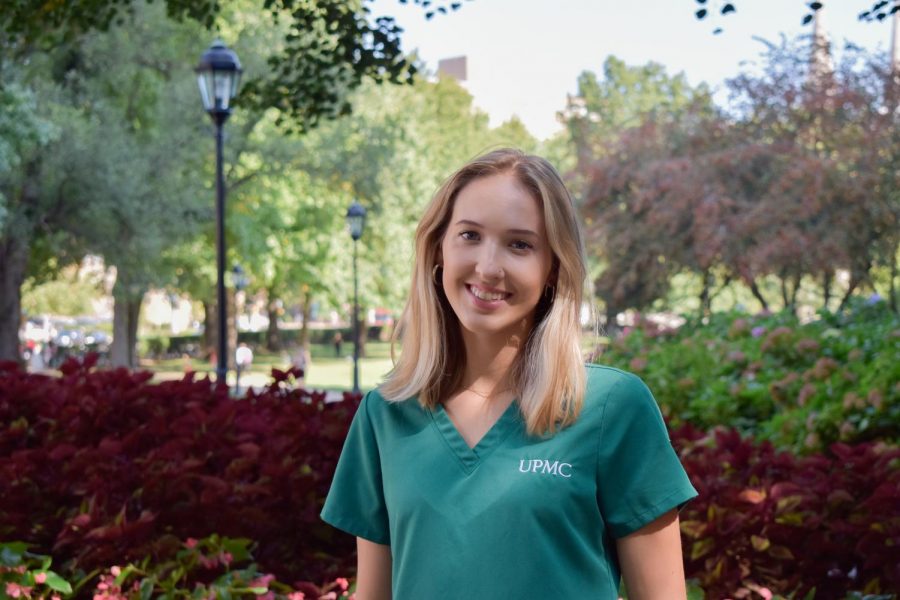Student health care workers discuss job joys, difficulties amid pandemic
Romita Das | Senior Staff Photographer
Gracelyn Mauro is a sophomore psychology major and a patient care technician at UPMC Presbyterian.
October 5, 2021
Caring for ventilated COVID-19 patients in the intensive care unit on Christmas was one of the hardest moments of Gracelyn Mauro’s job as a patient care technician at UPMC Presbyterian.
“That was probably the most difficult, especially during the holidays — it was really emotional,” Mauro, a sophomore psychology major, said. “I feel like it really put in perspective that even if someone doesn’t have [pre-existing] health conditions, it can still land you in the ICU on a vent.”
During the COVID-19 pandemic, the stakes of working in health care have increased, and student workers often feel a greater responsibility in these roles. Mauro said the importance of her work is clear. With the lives of patients in her hands, Mauro said the job has to be taken seriously.
“You can go to a job and work in retail and you can bulls— it,” Mauro said. “But if you try to work as a patient care tech, you can’t bulls— that — because if you do, most of the time it’s like, someone will die, or someone is going to get hurt, and that falls on you.”
Mauro said she has many tasks at the hospital, but overall, her job is making sure that patients are safe and everyone is being tended to.
“The basic work of a PCT is taking vitals, checking glucose levels, bed changing, bathing, walking people to the bathroom, making sure that people are getting out to their tests,” Mauro said. “Sometimes, depending on who your nurse is, you can also help with general wound care, and other things.”
Mauro said compared with other health care workers, patient care technicians often spend the most time with patients, which means they often catch crucial moments before doctors or nurses.
“A lot of the times it’s usually the techs that find people who are [coding], ‘cause you’re in there the most,” Mauro said.
Kathy Escobar Martinez, a first-year pharmacy student who works at UPMC Children’s Hospital in Pittsburgh’s Lawrenceville neighborhood, said the education student health care workers get on the job applies not just to their future careers, but also to their studies.
“Now that I’m in pharmacy school, it’s actually helping a lot because a lot of the medications that we’ve talked about in class have come up at work,” Escobar Martinez said.
Despite these educational benefits, Olivia Shenk, a sophomore biological sciences major who volunteers at UPMC Montefiore, said student health care workers still give up valuable time that could be used to complete homework or review materials from class.
“It’s taking away time that I could be studying,” Shenk said. “I only volunteer for three hours, but getting ready and going there and then coming home — it takes more than three hours when it’s all said and done.”
Mauro said the hours that student health care workers spend at hospitals each week can also affect their ability to take part in extracurriculars. In order to stay on top of her schoolwork, Mauro said she had to give up on club sports.
“I really did want to try to join the field hockey team here on campus, but honestly I don’t have all the time to commit to work, school and a sport,” Mauro said.
Escobar Martinez said besides the job impacting her time and energy, working in health care can have a less visible emotional impact, especially when working in an intensive care unit.
“A lot of the times I personally am scheduled to watch the pediatric ICU or the cardiac ICU on the fourth floor,” Escobar Martinez said. “You see what’s going on in those rooms, and it’s really hard and heartbreaking sometimes to be a witness to that.”
According to Mauro, the work’s emotional toll has only worsened by the COVID-19 pandemic. Mauro said she feels even more personally impacted by this risk because a relative is immunocompromised. She added that she follows all of the hospital’s mandated precautions, such as proper masking and PPE procedures, but said there is always a risk of contracting COVID-19.
“When I’m in the hospital, I always wear my mask, I really don’t take it down because that’s for my patients’ safety and my safety,” Mauro said. “I can honestly equate working in patient care [to] roulette, because you never know who you’re going to have, you never know who’s going to have what, especially with COVID.”
Shenk said she doesn’t deal with this same uncertainty on the rehab floor of UPMC Montefiore, since these patients are recovering over a longer period of time through physical therapy, from issues such as surgeries, strokes and amputations.
“Most of the patients have been in the hospital for a decent amount of time, and it’s not a super fast turnaround on my floor,” Shenk said. “It’s not like an ER or something, where it would be a lot more worrisome.”
Despite lost time and risks related to COVID-19, Escobar Martinez said she truly enjoys working at the hospital — and not just because it gives her work experience.
“It’s a really fun time,” Escobar Martinez said. “A lot of the times I don’t even mind that we’re short-staffed, because we make it work and we have fun.”








